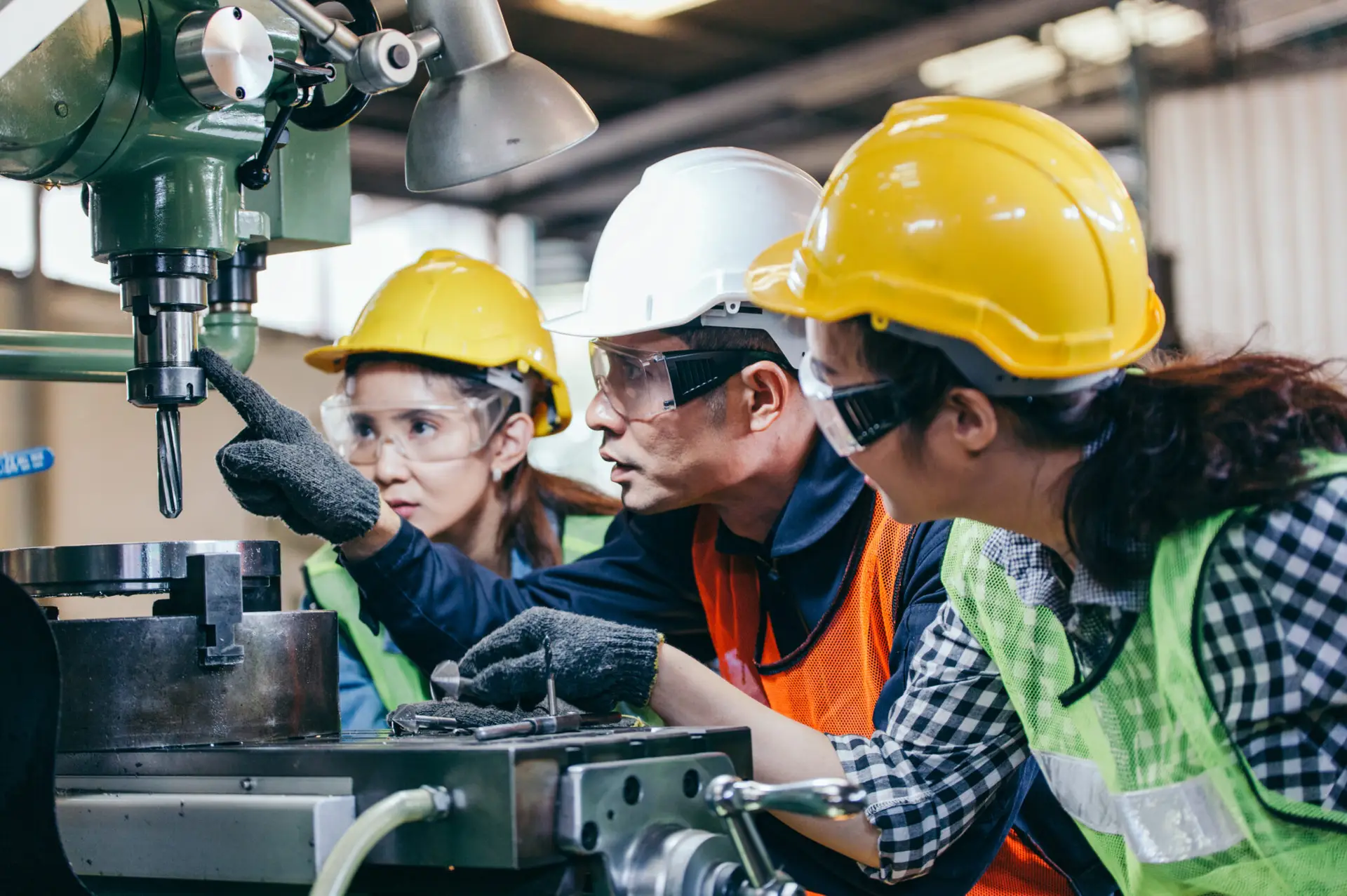Virginia manufacturing has momentum exemplified by new investment, modernized production, and an increased focus on supply chain resilience. Yet for many manufacturers, growth isn’t limited by demand. It’s limited by people.
That reality shows up in very practical ways: overtime becomes the default, supervisors spend more time “covering” than coaching, training becomes inconsistent across shifts, and quality issues appear not because employees don’t care but because the workforce system isn’t built to scale.
Workforce development is often talked about as a public-sector issue, in addition to something solved by training programs, high schools, or community colleges. In reality, workforce development is a business strategy. And inside a manufacturing operation, it becomes an HR strategy: how talent is sourced, onboarded, trained, scheduled, paid, developed, and retained. When those systems are strong, a manufacturer can increase output without increasing chaos. When those systems are weak, every new hire adds friction.
This article takes a manufacturing-first approach to workforce development in Virginia, not only but also grounded in what actually drives staffing stability, skill growth, and retention over time.
Content
- Why workforce development has become a manufacturing “continuity” issue
- What “workforce development” really means inside a manufacturing operation
- Virginia’s advantage: a strong training ecosystem, if employers operationalize it
- The retention truth in manufacturing: people don’t leave “manufacturing,” they leave avoidable instability
- Looking Ahead: The Future of Workforce Development for Manufacturing in Virginia
- Building a workforce development operating model that scales
- What a “people-first” manufacturing strategy actually looks like
- Soft next steps (for leaders who want to pressure-test their HR foundation)
- Frequently Asked Questions
Why workforce development has become a manufacturing “continuity” issue
The workforce conversation used to focus on hiring volume: “We just need more applicants.” Today, many manufacturers can generate candidates, but they struggle to consistently generate job-ready capability and retain it long enough to matter.
That shift is why workforce development belongs in leadership discussions alongside safety, quality, and throughput. When skill gaps persist, the operational impacts are measurable:
- Productivity suffers because fewer people can safely run complex equipment without constant supervision.
- Training time balloons because onboarding is improvised instead of structured.
- Quality escapes happen when task mastery varies by shift or supervisor.
- Turnover becomes contagious when experienced employees carry too much load and burn out.
It’s tempting to treat this as a labor market problem. But the labor market is only part of it. Workforce development becomes sustainable when employers treat talent like a pipeline with stages, for example recruit, onboard, train, certify, develop, promote, retain and then build systems that make each stage repeatable.

What “workforce development” really means inside a manufacturing operation
Workforce development in manufacturing is often misunderstood as a single initiative: tuition reimbursement, a new partnership, a hiring push, or a training event. Those help, but they don’t solve the underlying issue if the day-to-day employee experience is unstable.
In practice, workforce development is a combination of:
1) Capability creation
How quickly can a new hire become safe, competent, and productive in a defined role?
2) Capability reinforcement
How consistently do employees maintain quality and safety standards over time, especially across shifts and supervisors?
3) Capability progression
Do employees have a clear path from entry-level to skilled roles? Are raises, promotions, and training tied to measurable skill growth?
4) Capability retention
Do people stay long enough to turn training investment into operational returns?
All four depend on HR fundamentals that are sometimes overlooked because they aren’t glamorous: job clarity, onboarding structure, training documentation, consistent scheduling practices, supervisor coaching skills, and accurate pay.

Virginia’s advantage: a strong training ecosystem, if employers operationalize it
Virginia offers real workforce assets, especially through community college training pathways and apprenticeship resources. Programs like FastForward and registered apprenticeship frameworks can shorten time-to-skill and reduce training costs. But these programs are most effective when employers do the “internal work” that makes external training stick.
That internal work includes defining:
- What skills each role actually requires (not just the job title).
- What “good” looks like at 30/60/90 days.
- Which tasks require certification, signoff, or demonstrated proficiency.
- How mentors and supervisors will support the learning process.
In other words: Virginia’s ecosystem can help you build skills faster, but your operation needs a clear skills map and consistent training standards to take full advantage.
A common failure pattern looks like this: a manufacturer partners with training resources, brings in candidates, and then loses them because onboarding is chaotic, the schedule changes unpredictably, or pay issues erode trust. That isn’t a training problem. It’s a workforce system problem.

The retention truth in manufacturing: people don’t leave “manufacturing,” they leave avoidable instability
Manufacturing roles are demanding. Employees understand that. What breaks retention isn’t the work itself but it’s avoidable stress layered on top of the work: inconsistent expectations, unclear job pathways, uneven supervision, and payroll or timekeeping mistakes.
When HR leaders and operations leaders treat retention as “culture,” they often miss the basics that drive daily confidence:
Predictability: Do people know their schedule with enough notice to manage life? Are changes communicated consistently?
Fairness: Are job expectations and discipline consistent across shifts and supervisors?
Progression: Can a motivated employee see how to move from entry-level to skilled work?
Trust: Is pay correct and on time? Are policies enforced consistently?
These are not soft issues. They are operational stability issues. An employee’s willingness to stay is deeply tied to whether the workplace runs like a system or like a series of emergencies.
Looking Ahead: The Future of Workforce Development for Manufacturing in Virginia
The future of Virginia’s manufacturing workforce will be shaped by several forces:
- Automation and AI: Increasing productivity but requiring new technical skills.
- Reshoring of Supply Chains: Bringing more production back to Virginia, but also straining local talent pipelines.
- Generational Shifts: Younger workers will expect flexible schedules, digital tools, and opportunities to grow.
Companies that act now, by investing in training, retention, and workforce planning, will gain a clear advantage in the years ahead.
Building a workforce development operating model that scales
If you’re trying to create a workforce pipeline (not just fill seats), the most effective approach is to think in stages. Below is a narrative model you can use to evaluate your current state and identify where to strengthen.
Stage 1: Define the roles that matter most and describe what “competence” means
Many manufacturers know their hardest-to-fill jobs. Fewer can clearly describe what competence looks like in those roles.
Start with your top 3–5 roles that drive throughput or quality (maintenance techs, machinists, welders, line leads, operators on complex equipment). For each role, define a short competency profile:
- Core tasks (what they must reliably do)
- Safety-critical behaviors (non-negotiables)
- Equipment or systems they must operate
- Quality checks they must understand
- “Common failure points” where mistakes happen
This becomes the foundation for training, onboarding, mentoring, and fair performance management.
Stage 2: Build onboarding around production readiness, not paperwork completion
Onboarding fails when it treats orientation as the goal. Orientation is only the entry point; readiness is the goal.
A scalable onboarding system answers three questions for every new hire:
- What must they learn first to be safe?
- What tasks must they master to contribute?
- What support structure will prevent early frustration?
Manufacturers who reduce early turnover typically add structure like:
- A defined ramp plan (week 1, week 2–4, day 30/60/90)
- A mentor or “buddy” system with clear accountability
- Supervisor check-ins that focus on skill progress—not just attendance
- Training signoffs tied to demonstrated capability
The key is consistency. If onboarding varies by supervisor or shift, outcomes will vary too.
Stage 3: Create a skills-based progression pathway employees can actually see
“Career pathing” sounds corporate, but in manufacturing it can be practical and motivating when it’s grounded in skills.
A progression pathway works best when it is:
- Skills-based (employees earn advancement by mastering defined capabilities)
- Transparent (people understand the steps)
- Supported (training time and mentorship exist)
- Aligned to pay (raises connect to skill growth)
When employees can see how to move forward, retention improves and supervisors gain a structured tool for coaching rather than constantly “putting out fires.”
Stage 4: Train supervisors to lead development, not just enforce rules
Supervisors are often promoted because they’re technically strong. But the modern workforce challenge is not just technical it’s behavioral, developmental, and communication-based.
Small improvements in supervisor capability can have outsized impact on retention because supervisors determine:
- whether feedback feels fair
- whether training is consistent
- whether schedule changes feel respectful
- whether employees feel seen or disposable
Supervisor training doesn’t need to be complicated to be effective. Focus on:
- coaching conversations (clear expectations + support)
- consistent documentation and follow-through
- how to address performance early (before it becomes termination)
- how to reinforce safety and quality without creating disengagement
Stage 5: Stabilize the HR foundation so workforce development doesn’t collapse under growth
This is the part many organizations underestimate. Workforce development initiatives often fail not because training isn’t available, but because HR operations aren’t stable enough to support scaling.
If your organization is growing, you need:
- consistent timekeeping practices
- reliable payroll accuracy
- clear overtime rules and approvals
- standardized policies that are applied consistently
- clean records for training, certifications, and compliance
Workforce development isn’t separate from HR fundamentals. It depends on them.
What a “people-first” manufacturing strategy actually looks like
“People-first” can sound like branding. In a manufacturing environment, it becomes real when the workplace reduces uncertainty for employees and builds confidence in the system.
That means:
- training that is consistent across shifts
- expectations that are clear and fair
- supervisors who coach, not just correct
- pay that employees can trust
- progression that rewards skill-building
When those are true, workforce development becomes easier because employees stay long enough to become skilled, and skilled employees become the engine that trains the next wave.
Soft next steps (for leaders who want to pressure-test their HR foundation)
If your goal is a sustainable workforce pipeline and not just the next hire, two practical next steps can help you identify what to improve first:
- Visit our HR resource hub for practical guidance on compliance, onboarding, retention, and HR process design:
- Take the HR Risk Assessment to quickly surface risk areas and priorities (especially helpful if growth has outpaced your processes):
No pitch is just a structured way to identify where your workforce system needs reinforcement.
Dealing with an HR issue right now?
How Strong Is Your HR Foundation?
Go beyond compliance with insights from Beyond Compliance: How Strategic Payroll-Based Journals Drive Healthcare Growth. Learn how payroll data can inform smarter staffing, optimize labor costs, and support sustainable growth. Complete our quick HR Risk Assessment to see how your payroll and HR processes can drive real business impact.
Take Your HR Risk Assessment →Frequently Asked Questions
If you need help with workforce management, please contact PeopleWorX at 240-699-0060 | 1-888-929-2729 or email us at HR@peopleworx.io
What does “workforce development” mean for manufacturing in Virginia?
Workforce development in Virginia manufacturing means creating a reliable pipeline of skilled workers through recruiting, structured onboarding, training, and retention practices. It includes building repeatable skill pathways that is often supported by community college credential programs or apprenticeships—so employees can progress into higher-skill roles and stay longer.
Why is workforce development such a big issue for Virginia manufacturers right now?
Manufacturers are balancing tight labor markets, retirements, and evolving skill requirements. The challenge is no longer just finding applicants but also it’s building job-ready capability and retaining it long enough to protect quality, safety, and productivity.
What are the biggest workforce challenges for manufacturing companies in Virginia?
Common challenges include skilled-trade shortages, knowledge loss as experienced employees retire, retention pressure in competitive regions, and increased HR complexity when manufacturers operate across multiple locations or state lines.
What Virginia programs can help manufacturers train and upskill workers?
Manufacturers often leverage Virginia’s training ecosystem, including short-term credential programs through community colleges and registered apprenticeship frameworks. These options can reduce time-to-skill when employers align training to clear role requirements and structured onboarding.
How does FastForward help the manufacturing workforce in Virginia?
FastForward is designed to help individuals earn credentials more quickly through Virginia’s community college system, which can support faster entry into in-demand roles. It can be especially effective when employers use it as part of a larger skills pathway tied to specific manufacturing roles.
How do manufacturing apprenticeships work in Virginia?
Apprenticeships combine paid on-the-job learning with structured classroom instruction. Employers define the competencies apprentices must master, assign workplace mentoring, and build a repeatable pathway into skilled roles with clear progression over time.
What workforce strategies improve retention in manufacturing?
Retention improves when employees have structured onboarding, consistent training, clear expectations, predictable scheduling where possible, capable supervisors, and accurate pay. Clear progression pathways include where skill growth leads to advancement but also reduce early turnover.
How can HR and payroll processes support workforce development?
Workforce development depends on stable HR operations: consistent timekeeping, accurate payroll, clear wage-and-hour practices, and reliable training documentation. When HR fundamentals are strong, leaders have more capacity to focus on training, progression, and retention.
What makes multi-state payroll and compliance harder for Virginia manufacturers?
When employees work across borders or manufacturers operate multiple locations, HR teams must manage differences in tax withholding, labor rules, and policy consistency. Standardized processes and clear documentation reduce risk and prevent payroll or compliance issues from undermining employee trust.






